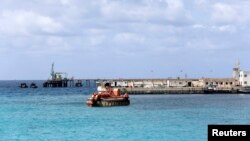CAIRO —
The Libyan military says it has regained control of at least one oil exporting port in the east of the country, following days of negotiations with separatists demanding a larger share of oil revenues.
Agreement by the two sides to reopen oil ports after a nine-month militia blockade was hailed as a breakthrough after a long and bitter tug-of-war. Talks between the interim government and the separatist militia occupying the ports had been going on for days.
Justice Minister Ali Mirghani told journalists the government would set up a commission to investigate alleged financial improprieties, as demanded by the separatists.
He said the government reached an agreement [with the separatists] to immediately open the ports of Zueitina and Harega, while reopening the ports of Sidra and Ras Lanouf, west of Benghazi, within two to four weeks.
He added, though, that talks are continuing over Ras Lanouf and Sidra. The Ras Lanouf and Sidra ports remain under control of militia commander Ibrahim Jadran, who is an ally of the self-proclaimed separatist “regional government of Barqa.”
Libyan military spokesman Colonel Ali Sheikhy said the port of Harega is now in the hands of the Libyan National Oil Company, and under operational control of the Arab Gulf Oil Company in order to resume oil exports.
Unconfirmed reports on Arab TV channels indicate militiamen still may be blocking operations at the Zueitina port.
A spokesman for the separatist Barqa regional authority, however, insisted two of the four ports it was occupying have been handed back to the government. He also said discussions would continue over the fate of the final two ports his group controls, but a financial arrangement with the government had yet to be reached. He claimed government operations of the facilities in the past were tainted by fraud.
Libya exported up to 3.5 million barrels of oil per day before the uprising against ousted leader Moammar Gadhafi began in February of 2011. The central government says it needs to resume exports in order to fund its operations.
Agreement by the two sides to reopen oil ports after a nine-month militia blockade was hailed as a breakthrough after a long and bitter tug-of-war. Talks between the interim government and the separatist militia occupying the ports had been going on for days.
Justice Minister Ali Mirghani told journalists the government would set up a commission to investigate alleged financial improprieties, as demanded by the separatists.
He said the government reached an agreement [with the separatists] to immediately open the ports of Zueitina and Harega, while reopening the ports of Sidra and Ras Lanouf, west of Benghazi, within two to four weeks.
He added, though, that talks are continuing over Ras Lanouf and Sidra. The Ras Lanouf and Sidra ports remain under control of militia commander Ibrahim Jadran, who is an ally of the self-proclaimed separatist “regional government of Barqa.”
Libyan military spokesman Colonel Ali Sheikhy said the port of Harega is now in the hands of the Libyan National Oil Company, and under operational control of the Arab Gulf Oil Company in order to resume oil exports.
Unconfirmed reports on Arab TV channels indicate militiamen still may be blocking operations at the Zueitina port.
A spokesman for the separatist Barqa regional authority, however, insisted two of the four ports it was occupying have been handed back to the government. He also said discussions would continue over the fate of the final two ports his group controls, but a financial arrangement with the government had yet to be reached. He claimed government operations of the facilities in the past were tainted by fraud.
Libya exported up to 3.5 million barrels of oil per day before the uprising against ousted leader Moammar Gadhafi began in February of 2011. The central government says it needs to resume exports in order to fund its operations.




